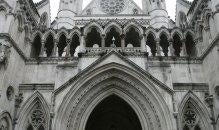
A order which had banned the media from naming a 14-year-old anti-whaling campaigner when she appeared in a magistrates’ court after being arrested during a protest at an embassy was lifted after representations by the BBC and the Press Association.
The BBC briefed barrister Guy Vassall-Adams to challenge the order at a hearing at City of Westminster Magistrates’ Court on Friday last week at which the Crown Prosecution Service confirmed to District Judge Quentin Purdy that it was dropping the case of trespass against teenaged protester Sophie Wyness and her father Martin.
Press Association media law specialist Mike Dodd had also submitted a letter to the court arguing that the anonymity order, under section 39 of the Children and Young Persons Act 1933, should be lifted.
District Judge Purdy made the order, which banned publication of anything which would identify Sophie Wyness, when she first appeared in court after having been arrested on January 24 during an anti-whaling protest at the Japanese embassy in London.
He dismissed protests from the lawyer representing Sophie and her father that anonymity was unwanted and unwelcome, saying that she was only appearing in an adult court because she was charged with an adult, and that she would automatically have received anonymity had she been appearing in a Youth Court.
Vassall-Adams argued at the hearing that the authorities showed that the distinction between youth courts, where anonymity for juveniles is automatic, and adult courts, where it is not, had to be preserved, and also showed that the fact that a defendant was a juvenile was not of itself a sufficient reason for making a reporting restriction order.
In addition, he argued, section 39 orders were intended to protect juveniles from unwanted and intrusive publicity – but Sophie and her father had both been willing to talk to the press.
Sophie’s activities had also been reported across the world before the case reached court, and anyone who knew anything about the case would easily be able to identify her.
District Judge Purdy agreed to lift the order, saying it was clear that it was unworkable in view of the amount of publicity the case had attracted.
The Crown prosecution Service said it dropped the case because there was no realistic expectation of a conviction.
But Sophie, who wants to become a politician, said: “I think the reason they dropped it was not because of lack of evidence, but because they don’t want to damage commercial ties with Japan.
“If they have resources to spend on trivial prosecutions like this, they should really be putting them into the fight against Japan’s barbaric whaling industry, which is illegal under international law.”
Email pged@pressgazette.co.uk to point out mistakes, provide story tips or send in a letter for publication on our "Letters Page" blog
